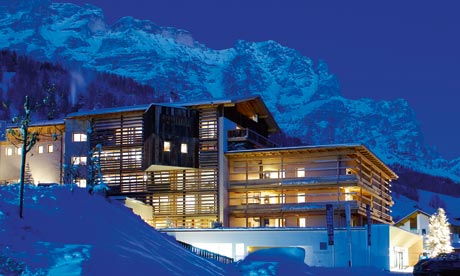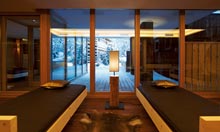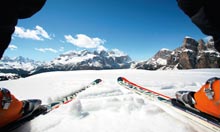
There is something about taking a train journey across the European Alps that can melt the heart of even the most hardened traveller. My 7.30am start from a snow-packed Munich, where I live, is followed by a five-hour whiz through landmark stops: Rosenheim at the foot of the Bavarian Alps, Innsbruck in Austria, the Brenner Pass to Italy, before a change at Fortezza, in the heart of the Unesco World Heritage-listed Dolomites, followed by a further train trip to Brunico.
My ultimate destination is Lagació Mountain Residence, in the small mountain town of San Cassiano, Alta Badia, in the province of Bolzano-Bozen. A one-hour car journey from Brunico takes me through a mesmerising sequence of hairpin bends, inclines and tunnels. I reach San Cassiano as snow begins to swirl down. Gazing up, it is impossible to see the higher peaks because of cloud, but the landscape is dramatic. Mountains appear to be wrapped around this small town, and when combined with the cloud cover, the peaks bring to mind images of bygone centuries when inhabitants of the Alps lived in fear of dragons and other creatures.The principal challenge facing the contemporary Alps revolves around sustainability. When Lagació opened in December 2009, it was certified by South Tyrol's Climate House Agency as CasaClima A, the second-highest award possible in a scheme that evaluates the energy efficiency of buildings in this autonomous region of Italy. Lagació uses fewer than 30kWh per square metre for heating, compared with 120 to 220 for a typical building in South Tyrol. Not carbon neutral, but for the eco-conscious tourist, a better bet than most lodges and hotels in the Alps.
"We were not thinking about creating an eco hotel," explains Margareth Canins, owner (with husband Pio) and the beating heart of the hotel. "The eco elements – the type of windows and solar energy, for example – sort of evolved; it was a process. Our architect wanted to use lots of different materials, such as Formica, and I refused. I wanted woods and slates," she says adamantly. "The architect asked me if I really wanted to use all of this material just for guests. I told him: 'We are also doing it for us, the family.' If I come out of my apartment [which is above the hotel] I need to feel at home. Only then will guests also feel at home. Sustainability has always been very important to me, but most important was that everyone has to feel comfortable here."

The subterranean spa at Lagació. Photograph: Marcel Hagen The 29-apartment Lagació cost around €8m to build and took just eight months to complete. It quickly caught the imagination of German and Italian style magazines for its attractive mountain location, spacious rooms and minimalist design, not to mention the subterranean spa. Margareth insisted on using local materials throughout, such as pine, spruce and larch, loam and loden fabrics, though the slate for the stairs comes from Brazil, she tells me. Water, from a local spring, is "revitalised" using the Grander method: a process which claims to add "energy" to improve the "structure" of water via magnetic generators.
Of the 18 staff at Lagació, seven belong to the local Ladin population, which has inhabited parts of the Dolomites for centuries. South Tyrol is an area that until relatively recently belonged to that behemoth of European history, the Austro-Habsburg dynasty. It was only in the wake of Austria's defeat in the First World War that it was handed to Italy. The Italian-Austrian-German influences are a huge part of the appeal of this part of the world and manifest themselves in the food, architecture and language.
I get a first-hand insight into the language complexities in conversations with Margareth. She insists on speaking English (she needs the practice, she says), but we are intermittently interrupted by her son Matteo, who occasionally appears to be speaking the wonderfully impenetrable South Tyrolean German dialect; at other times, I hazard a guess that he is speaking Ladin, a Rhaeto-Romance language spoken by around 40,000 people in the Alps. Indeed, "Ladin is not a dialect, it's a language" is a sentence I hear often. In addition to German and Ladin, away from the hotel, in shops and at school for example, Matteo might also speak the third regional language, Italian. Visitors with decent German or Italian will have no trouble, but English is strictly in fourth place here.
As topics of conversation, only food comes near family as the most popular subject during my stay. Breakfast is the principal meal served at Lagació, taken in the Stube, the spacious and rustic L-shaped breakfast room characterised by old beams and cabinets. Within the Stube there is a smaller, more intimate and refined dining room. All the food is produced locally, which for breakfast means home-baked breads, cheeses, fruits, eggs, mueslis, cold meats, plus other local specialities and honey. As the buffet is available until 11am, guests are encouraged to take their time, relax, and enjoy the food and a chat.
Lagació's spacious apartments range from doubles to family rooms. My own U-shaped apartment, Bellerophon (all apartments are named after Dolomite fossils), has an intelligently designed walk-in wooden wardrobe near the entrance, perfect for discarding wet clothes and muddy boots, a huge bed and – best of all – patio doors that lead to a balcony from where the mountains seem to be within touching distance. As this is San Cassiano, however, the stylish fitted kitchen is unlikely to get much use during my short stay: with two Michelin-starred restaurants in San Cassiano itself (St Hubertus, led by executive chef Norbert Niederkofler, is just 300m away), and a handful of other more reasonably priced options, it is no surprise that the wider Alta Badia area has been labelled by the Ski Club of Great Britain as "probably the best resort in the world for foodies". Try regional specialities canederli (bread-based dumplings) and tutres (ricotta cheese, sauerkraut or spinach pancake-like dishes), while gnocchi and strudel are staples on most menus.

With great food and plentiful snow, added to the spectacular background of the Dolomites, the economies of numerous small communities have inevitably come to rely on attracting winter-sports tourists during the winter months. Alta Badia is neither considered the most challenging ski area to be found in the Alps (90% of slopes are deemed "easy" and "medium"), nor is it renowned for après-ski excitement. While 95 slopes across 130km in a spectacular location is an obvious attraction, many visitors are enticed by its decidedly relaxed, more family-oriented atmosphere.
The impact on the natural environment, however, of snow-making machines, countless lodges perched halfway up mountains and numerous ski lifts (450 in the Dolomiti Superski Skipass area alone) is obvious. The managing director of Lagació, Christof Irsara, sensibly does not deny the contradiction, admitting that much work needs to be done for winter sports to become more sustainable. He points to a "growing trend for walking activities in the snow, activities that do not need a ski lift, for example". It is, however, difficult to imagine tens of thousands of passionate skiers and snowboarders converting to the less exhilarating sport of snow walking.
But it is equally difficult to be overly critical. Lagació could be described as a reluctant eco hotel pin-up. Sustainability has always been just one aspect of Margareth's wider vision of creating a hotel that is built and decorated almost exclusively with natural materials, that is family-focused and that relies entirely on locally produced food. The result should be warmly welcomed: Lagació is ahead of much of the field not just in terms of style and hospitality, but also in terms of sustainability.
Good place to start… 90% of the runs are easy or moderate.
Hiç yorum yok:
Yorum Gönder